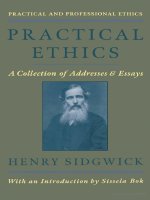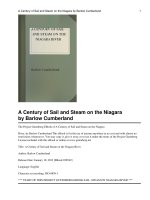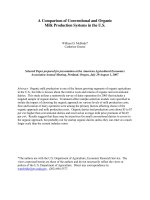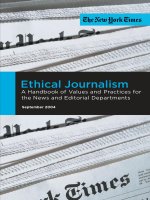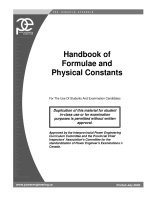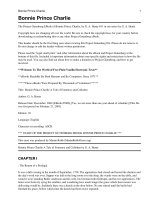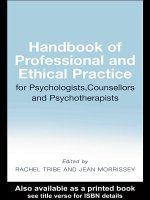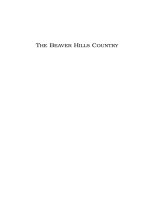Ethical Journalism A Handbook of Values and Practices for the News and Editorial Departments pdf
Bạn đang xem bản rút gọn của tài liệu. Xem và tải ngay bản đầy đủ của tài liệu tại đây (1.08 MB, 57 trang )
Ethical Journalism
A Handbook of Values and Practices for
the News and Editorial Departments
September 2004
Journalism
Ethical
A Handbook of Values and
Practices for the News
and Editorial Departments
“ Reporters, editors, photographers and all members
of the news staff of The New York Times share a
common and essential interest in protecting the integrity
of the newspaper. As the news, editorial and business
leadership of the newspaper declared jointly in 1998:
‘Our greatest strength is the authority and reputation of
The Times. We must do nothing that would undermine
or dilute it and everything possible to enhance it.’ ”
Guidelines on Our Integrity, May 1999
1. Introduction and Purpose 3
The Scope of These Guidelines 3
Other Standards of Behavior 5
2. Our Duty to Our Readers 7
3. Pursuing the News 8
Personal Relations with Sources 8
Obeying the Law in Pursuit of the News 9
Accepting Hospitality From Sources 10
Dealing with the Competition 11
4. Protecting the Paper’s Neutrality 12
Providing Financial or Other Advice 13
Speaking Engagements 14
Competitions and Contests 16
The Use of Borrowed Equipment 17
Collaboration and Testimonials 18
5. Participation in Public Life 19
Voting, Campaigns and Public Issues 19
Community Service 21
6. Advertisers, Marketing, Promotion 23
7. Obligations to The Times 24
Speaking for The Times 24
8. Books, Movies, Reprints and Copyright 25
9. Journalistic Work Outside The Times 28
ETHICAL JOURNALISM
Table of Contents
2
10. Appearing on Broadcast Media 31
11. Sorting Out Family Ties 33
Disclosure of Possible Conflicts 33
12. Investments and Financial Ties 35
Affirming Good-Faith Compliance 36
Business-Financial, Technology and Media News 37
Transitional Arrangements 38
Annual Filing by Ranking Editors 39
13. Rules for Specialized Departments 40
Sports 40
Culture, Styles, Dining 40
Art, Pictures, Technology 42
Automobiles 42
Travel 43
14. Dealing with Outside Contributors 44
Appendix A. 45
Sample letter declining a gift 45
Appendix B. 46
Sample letter declining an unsolicited award 46
Appendix C. 47
Letter of understanding with the
Newspaper Guild of New York 47
Index 49
ETHICAL JOURNALISM
Table of Contents
3
1. The goal of The New York Times is to cover the news as
impartially as possible — “without fear or favor,” in the words
of Adolph Ochs, our patriarch — and to treat readers, news
sources, advertisers and others fairly and openly, and to be
seen to be doing so. The reputation of The Times rests upon
such perceptions, and so do the professional reputations of
its staff members. Thus The Times and members of its news
department and editorial page staff share an interest in avoiding
conflicts of interest or an appearance of a conflict.
2. For more than a century, men and women of The Times have
jealously guarded the paper’s integrity. Whatever else we
contribute, our first duty is to make sure the integrity of
The Times is not blemished during our stewardship.
3. Conflicts of interest, real or apparent, may come up in many
areas. They may involve the relationships of staff members with
readers, news sources, advocacy groups, advertisers, or competitors;
with one another, or with the newspaper or its parent company.
And at a time when two-career families are the norm, the civic
and professional activities of spouses, family and companions
can create conflicts or the appearance of conflicts.
4. In keeping with its solemn responsibilities under the First
Amendment, The Times strives to maintain the highest standards
of journalistic ethics. It is confident that its staff members share
that goal. The Times also recognizes that staff members should
be free to do creative, civic and personal work and to earn extra
income in ways separate from their work at The Times. Before
engaging in such outside activities, though, staff members
should exercise mature professional judgment and consider the
stake we all have in The Times’s irreplaceable good name.
The Scope of These Guidelines
5. These guidelines generally apply to all members of the news
and editorial departments whose work directly affects the
content of the paper, including those on leaves of absence.
ETHICAL JOURNALISM
Introduction and Purpose
1
4
They include reporters, editors, editorial writers, photographers,
picture editors, art directors, artists, designers, graphics editors
and researchers. This group of professional journalists is what
this text means by “staff” or “staff members.”
6. News clerks, administrative assistants, secretaries and other
support staff are generally not bound by these strictures, with
two important exceptions: First, no newsroom or editorial
page employee may exploit for personal gain any nonpublic
information acquired at work, or use his or her association
with The Times to gain favor or advantage. And second, no
one may do anything that damages The Times’s reputation for
strict neutrality in reporting on politics and government; in
particular, no one may wear campaign buttons or display any
other form of political partisanship while on the job.
7. Our contracts with freelance contributors require them to avoid
conflicts of interest, real or apparent. In keeping with that, they
must honor these guidelines in their Times assignments, as set
forth in Section 14.
8. The Times believes beyond question that its staff shares the
values these guidelines are intended to protect. In the past The
Times has resolved differences of view over applying these val-
ues amiably through discussion, almost without exception.
The paper has every reason to believe that pattern will con-
tinue. Nevertheless, The Times views any deliberate violation
of these guidelines as a serious offense that may lead to disci-
plinary action, potentially including dismissal, subject to the
terms of any applicable collective bargaining agreement.
9. Our fundamental purpose is to protect the impartiality and
neutrality of The Times and the integrity of its report. In
many instances, merely applying that purpose with common
sense will point to the ethical course. Sometimes the answer is
self-evident. Simply asking oneself whether a course of action
might damage the paper’s reputation is often enough to gauge
whether the action is appropriate.
ETHICAL JOURNALISM
1
Introduction and Purpose
5
10. Every staff member is expected to read this document carefully
and to think about how it might apply to his or her duties.
A lack of familiarity with its provisions cannot excuse a
violation; to the contrary, it makes the violation worse. The
provisions presented here can offer only broad principles and
some examples. Our world changes constantly, sometimes
dramatically. No written document could anticipate every
possibility. Thus we expect staff members to consult their
supervisors and the standards editor or the deputy editorial
page editor if they have any doubts about any particular
situation or opportunity covered by this document. In most
cases an exchange of e-mails should suffice.
11. Thus this handbook is not an exhaustive compilation of all
situations that may give rise to an actual or perceived conflict
of interest. It does not exclude situations or issues giving rise
to such conflicts simply because they are not explicitly covered
within this document, nor does the document or any of its
particular provisions create an implied or express contract of
employment with any individual to whom the guidelines
apply. The Times reserves the right to modify and expand the
guidelines from time to time, as appropriate. (See the letter of
understanding with the Newspaper Guild of New York,
included as Appendix C below.)
12. The authority to interpret and apply these guidelines is
vested in department heads and ranking editors, most notably
in the standards editor and the deputy editorial page editor.
They may delegate that duty to their ranking assistants, but
they remain responsible for decisions made in their name.
Other Standards of Behavior
13. In addition to this handbook, we observe the Newsroom
Integrity Statement, promulgated in 1999, which deals with
such rudimentary professional practices as the importance of
checking facts, the exactness of quotations, the integrity of
photographs and our distaste for anonymous sourcing; and
ETHICAL JOURNALISM
1
Introduction and Purpose
6
the Policy on Confidential Sources, issued in 2004. These
documents are available from the office of the associate
managing editor for news administration or on the Newsroom
home page under Policies.
14. As employees of the Times Company, we observe the Rules of the
Road, which are the axiomatic standards of behavior governing
our dealing with colleagues and going about our work. The
Rules are available from the office of the associate managing
editor for news administration. Together with a statement
of supporting principles, the Rules are on the Internet at
/>We also observe the company’s policies against harassment and
on computers and electronic communications, which appear
on the Internet at />POLICIES/policies.html.
ETHICAL JOURNALISM
1
Introduction and Purpose
7
15. The Times treats its readers as fairly and openly as possible. In
print and online, we tell our readers the complete, unvarnished
truth as best we can learn it. It is our policy to correct our
errors, large and small, as soon as we become aware of them.
16. We treat our readers no less fairly in private than in public.
Anyone who deals with readers is expected to honor that
principle, knowing that ultimately the readers are our employers.
Civility applies whether an exchange takes place in person, by
telephone, by letter or online. Simple courtesy suggests that
we not alienate our readers by ignoring their letters and e-mails
that warrant reply.
17. The Times gathers information for the benefit of its readers.
Staff members may not use their Times position to make
inquiries for any other purpose. As noted in paragraph 6, they
may not seek any advantage for themselves or others by acting
on or disclosing information acquired in their work but not
yet available to readers.
18. Staff members who plagiarize or who knowingly or recklessly
provide false information for publication betray our fundamental
pact with our readers. We will not tolerate such behavior.
ETHICAL JOURNALISM
Our Duty to Our Readers
2
8
19. The Times treats news sources just as fairly and openly as it
treats readers. We do not inquire pointlessly into someone’s
personal life. Staff members may not threaten to damage
uncooperative sources. They may not promise favorable
coverage in return for cooperation. They may not pay for
interviews or unpublished documents.
20. Staff members should disclose their identity to people they
cover (whether face to face or otherwise), though they need
not always announce their status as journalists when seeking
information normally available to the public. Staff members
may not pose as police officers, lawyers, business people
or anyone else when they are working as journalists. (As
happens on rare occasions, when seeking to enter countries
that bar journalists, correspondents may take cover from
vagueness and identify themselves as traveling on business
or as tourists.)
21. Theater, music and art critics and other writers who review
goods or services offered to the public may conceal their
Times connection but may not normally assert a false identity
or affiliation. As an exception, restaurant critics may make
reservations in false names to protect their identity.
Restaurant critics and travel writers must conceal their Times
affiliation to eliminate the possibility of special treatment.
Personal Relations with Sources
22. Relationships with sources require the utmost in sound
judgment and self discipline to prevent the fact or appearance
of partiality. Cultivating sources is an essential skill, often
practiced most effectively in informal settings outside of
normal business hours. Yet staff members, especially those
assigned to beats, must be sensitive that personal relationships
with news sources can erode into favoritism, in fact or
appearance. And conversely staff members must be aware
that sources are eager to win our good will for reasons of
their own.
ETHICAL JOURNALISM
3
Pursuing the News
9
23. Even though this topic defies hard and fast rules, it is essential
that we preserve a professional detachment, free of any whiff of
bias. Staff members may see sources informally over a meal or
drinks, but they must keep in mind the difference between
legitimate business and personal friendship. A City Hall
reporter who enjoys a weekly round of golf with a City Council
member, for example, risks creating an appearance of coziness,
even if they sometimes discuss business on the course. So does a
reporter who joins a regular card game or is a familiar face in a
corporation’s box seats or who spends weekends in the
company of people he or she covers. Scrupulous practice requires
that periodically we step back and take a hard look at whether we
have drifted too close to sources we deal with regularly. The acid
test of freedom from favoritism is the ability to maintain good
working relationships with all parties to a dispute.
24. Clearly, romantic involvement with a news source would foster
an appearance of partiality. Therefore staff members who develop
close relationships with people who might figure in coverage they
provide, edit, package or supervise must disclose those relationships
to the standards editor, the associate managing editor for news
administration or the deputy editorial page editor. In some cases,
no further action may be needed. But in other instances staff
members may have to recuse themselves from certain coverage.
And in still other cases, assignments may have to be modified
or beats changed. In a few instances, a staff member may have to
move to a different department — from business and financial
news, say, to the culture desk—to avoid the appearance of conflict.
Obeying the Law in Pursuit of the News
25. Staff members must obey the law in the pursuit of news. They
may not break into buildings, homes, apartments or offices.
They may not purloin data, documents or other property,
including such electronic property as databases and e-mail or
voice mail messages. They may not tap telephones, invade
computer files or otherwise eavesdrop electronically on news
sources. In short, they may not commit illegal acts of any sort.
ETHICAL JOURNALISM
3
Pursuing the News
10
26. Staff members may not use the identification cards or special
license plates issued by police or other official agencies except
in doing their jobs. Staff members who have applied for or
hold “NYP” or other special plates should disclose that fact to
the associate managing editor for news administration or the
deputy editorial page editor. Staff members whose duties do
not require special plates must return them.
27. Staff members may not record conversations without the prior
consent of all parties to the conversations. Even where the law
allows recording with only one party aware of it, the practice is
a deception. Masthead editors may make rare exceptions to this
prohibition in places where recordings made secretly are legal.
Accepting Hospitality from Sources
28. The Times pays the expenses when its representatives
entertain news sources (including government officials) or
travel to cover them. In some business situations and in
some cultures, it may be unavoidable to accept a meal or a
drink paid for by a news source. For example, a Times
reporter need not decline every invitation to interview an
executive over lunch in the corporation’s private dining
room, where it is all but impossible to pick up the check.
Whenever practical, however, the reporter should suggest
dining where The Times can pay. A simple buffet of muffins
and coffee at a news conference, for example, is harmless,
but a staff member should not attend a breakfast or lunch
held periodically for the press by a “newsmaker” unless The
Times pays for the staff member’s meals.
29. Staff members may not accept free or discounted transportation
and lodging except where special circumstances give us
little or no choice. Among them are certain military or
scientific expeditions and other trips for which alternative
arrangements would be impractical — for example, a flight
aboard a corporate jet during which an executive is interviewed.
Staff members should consult their supervisors and the
ETHICAL JOURNALISM
3
Pursuing the News
11
standards editor or the deputy editorial page editor when
special circumstances arise.
30. Staff members who review artistic performances or cover
athletic or other events where admission is charged (for example,
the New York Auto Show) may accept the press passes or
tickets customarily made available. No other staff members,
not even editors in the culture and sports departments, may
accept free tickets. Even when paying the box office price, no
staff member may use his or her Times position to request
choice or hard-to-get seats unless the performance has a clear
bearing on his or her job.
Dealing with the Competition
31. Staff members compete zealously but deal with competitors
openly and honestly. We do not invent obstacles to hamstring
their efforts. When we use facts reported by another publication,
we attribute them.
32. Staff members may not join teams covering news events for
other organizations, and they may not accept payment from
competitors for news tips. They may not be listed on the
masthead of any non-Times publication, except for publications
serving organizations of the sort described in paragraph 70.
Common examples include a church or synagogue newsletter,
an alumni magazine or a club bulletin.
ETHICAL JOURNALISM
3
Pursuing the News
12
33. Staff members may not accept gifts, tickets, discounts,
reimbursements or other inducements from any individuals
or organizations covered by The Times or likely to be covered
by The Times. (Exceptions may be made for trinkets of
nominal value, say, $25 or less, such as a mug or a cap with a
company logo.) Gifts should be returned with a polite
explanation. A sample letter for use in such situations appears
below as Appendix A.
34. Staff members may not accept employment or compensation of
any sort from individuals or organizations who figure or are likely
to figure in coverage they provide, edit, package or supervise.
35. Staff members may not accept anything that could be construed
as a payment for favorable coverage or as an inducement to
alter or forgo unfavorable coverage. They may share in reprint
fees that other journalistic media pay The Times, according to
the terms of our contract with the Newspaper Guild. They
may also share in fees paid by non-journalistic parties for
permission to reprint Times material in advertisements or
promotions, though their share of those fees may not exceed
$200 an article.
36. Staff members may accept any gifts or discounts available to the
general public. Normally they are also free to take advantage of
conventional corporate discounts that the Times Company
has offered to share with all employees (for example, corporate
car rental rates). And staff members may accept free admission
at museums or other benefits extended to all Times employees
by virtue of the Times Company Foundation’s support of
various cultural institutions.
37. Staff members must be mindful, however, that large discounts
— even those negotiated by the Times Company — may create
the appearance of partiality, especially by those who have a
hand in the coverage of the company or industry offering the
discount. If General Motors, for instance, offers substantial
trade discounts to all Times Company employees, the Detroit
ETHICAL JOURNALISM
4
Protecting the Paper’s Neutrality
13
correspondent should not accept without discussing the
possible appearance of favoritism with the responsible editors.
If any such discounts do raise doubts, staff members should
bring them to the attention of their department heads and
the standards editor or the deputy editorial page editor
before accepting.
38. Unless the special terms are offered by The New York Times
Company or a Times subsidiary or affiliate, staff members
may not buy stock in initial public offerings through “friends
and family shares” where any plausible possibility exists of a
real or apparent conflict of interest. Staff members may not
accept allocations from brokerage firms.
Providing Financial or Other Advice
39. It is an inherent conflict for a Times staff member to perform
public relations work, paid or unpaid. Staff members may not
advise individuals or organizations how to deal successfully
with the news media (though they may of course explain
the paper’s normal workings and steer outsiders to the
appropriate Times person). They may not, for example, advise
candidates for public office, write or edit annual reports or
contribute to the programs of sports teams. They should
not take part in public relations workshops that charge
admission or imply privileged access to Times people, or
participate in surveys asking their opinion of an organization’s
press relations or public image. They are free, however, to
offer reasonable help to institutions such as their child’s
school, a small museum, a community charity or their
house of worship. (See paragraph 70 for a fuller discussion
of permissible participation.)
40. Staff members may not serve as ghost writers or co-authors
for individuals who figure or are likely to figure in coverage
they provide, edit, package or supervise. They may not
undertake such assignments for organizations that espouse
a cause.
ETHICAL JOURNALISM
4
Protecting the Paper’s Neutrality
14
41. Staff members may not engage in financial counseling (except
in the articles they write). They may not manage money for
others, proffer investment advice, or operate or help operate an
investment company of any sort, with or without pay. They
may not do anything that would require registration as an
investment adviser. They may, however, help family members
with ordinary financial planning and serve as executors or
administrators of estates of relatives and friends and as
court-appointed conservators and guardians.
Speaking Engagements
42. The Times freely acknowledges that outside appearances can
enhance the reputation of its bylines and serve the paper’s
interests. Nevertheless, no staff member may appear before an
outside group if the appearance could reasonably create an
actual or apparent conflict of interest or undermine public
trust in the paper’s impartiality. No staff member who takes
part in a broadcast, Webcast, public forum or panel discussion
may write or edit news articles about that event.
43. Staff members should be especially sensitive to the appearance
of partiality when they address groups that might figure in
coverage they provide, edit, package or supervise, especially
if the setting might suggest a close relationship to the
sponsoring group. Before accepting such an invitation, a
staff member must consult with the standards editor or the
deputy editorial page editor. Generally, a reporter recently
returned from the Middle East might comfortably address a
suburban synagogue or mosque but should not appear before
a group that lobbies for Israel or the Arab states. A reporter
who writes about the environment could appropriately
speak to a garden club but not to conservation groups
known for their efforts to influence public policy.
44. Staff members may not accept invitations to speak before a
single company (for example, the Citigroup executive retreat)
ETHICAL JOURNALISM
4
Protecting the Paper’s Neutrality
15
or an industry assembly (for example, organized baseball’s
winter meeting) unless The Times decides the appearance is
useful and will not damage the newspaper’s reputation for
impartiality. In that case, The Times will pay expenses; no
speaker’s fee should be accepted. Staff members invited to
make such appearances should consult their supervisors and
the standards editor or the deputy editorial page editor.
45. Staff members should not accept invitations to speak where
their function is to attract customers to an event primarily
intended as profit-making.
46. Staff members may accept speaking fees, honorariums,
expense reimbursement and free transportation only from
educational or other nonprofit groups for which lobbying and
political activity are not a major focus. If a speaking fee exceeds
$5,000, the staff member must consult the standards editor,
the associate managing editor for news administration or the
deputy editorial page editor before accepting.
47. Staff members who accept fees, honorariums or expenses for
speaking engagements must file with the associate managing
editor for news administration or the deputy editorial page
editor by January 31 of each year an accounting of the
previous year’s appearances. If their fees total less than $5,000,
no annual accounting is required. Fees earned under Times
auspices for promotional or other approved purposes need
not be included.
48. Staff members who write books and want to promote them
must give their supervisor a schedule of proposed appearances.
They may accept routine expenses and fees in promotional
appearances, but they must make every effort to ensure that
their appearances conform to the spirit of these guidelines and
do not interfere with their responsibilities to the paper. If they
have doubts about an appearance, they must consult their
supervisor and the standards editor or the deputy editorial
page editor.
ETHICAL JOURNALISM
4
Protecting the Paper’s Neutrality
16
49. Speeches and other outside endeavors by staff members,
paid or unpaid, should not imply that they carry the
endorsement of The Times (unless they do). To the
contrary, the staff member should gracefully remind the
audience that the views expressed are his or her own.
Outside commitments should not interfere with the speaker’s
responsibilities at The Times. Thus no staff member should
agree to an extensive speaking schedule without approval
from a supervisor.
Competitions and Contests
50. Staff members may not enter competitions sponsored by
individuals or groups who have a direct interest in the tenor
of Times coverage. They may not act as judges for these
competitions or accept their awards. Common examples are
contests sponsored by commercial, political or professional
associations to judge coverage of their affairs. The standards
editor or the deputy editorial page editor may make exceptions
for competitions underwritten by corporate sponsors if broad
in scope and independently judged, such as the University
of Missouri awards for consumer journalism, long sponsored
by J.C. Penney.
51. Staff members may compete in competitions sponsored by
groups whose members are all journalists or whose members
demonstrably have no direct interest in the tenor of coverage
of the field being judged. Times staff members may act as
judges for such competitions and accept their awards. For
example, a staff member may enter a university-sponsored
competition for coverage of economic or foreign affairs
but not accept an advocacy group’s prize for outstanding
environmental coverage.
52. This prohibition on taking part in sponsored competitions
applies to film festivals or awards in which critics are asked to vote
and to such competitions as the Tony Awards, the Heisman
Trophy, most valuable player and rookie of the year honors
ETHICAL JOURNALISM
4
Protecting the Paper’s Neutrality
17
and admission to sports halls of fame. Cooperation of this sort
puts the paper’s independence into question.
53. A current list of some competitions that The Times has
approved is posted on the Newsroom home page under
Policies. Staff members who would like to enter others
should consult their supervisors and the standards editor or
the deputy editorial page editor. A critical factor in approving
a competition, whatever its sponsorship, is a record of
arm’s-length decisions, including a willingness to honor
critical reporting.
54. Staff members who win unsought awards from groups that do
not meet the criteria established here should decline politely.
A sample reply appears below as Appendix B.
55. Normally staff members are free to accept honorary degrees,
medals and other awards from colleges, universities and other
educational institutions. Those who cover higher education or
supervise that coverage should be sensitive to any appearance
of coziness or favoritism. Those in doubt should consult the
standards editor or the deputy editorial page editor.
The Use of Borrowed Equipment
56. Staff members who borrow equipment, vehicles or other
goods for evaluation or review must return the borrowed
items as soon as possible. Similarly, items borrowed to be
photographed, such as fashion apparel or home furnishings,
should be returned promptly.
57. Staff members may keep for their own collections — but may
not sell or copy — books, recordings, tapes, compact discs and
computer programs sent to them for review. Such submissions
are considered press releases. Recorded or digital media, such as
tapes or disks, must be destroyed or returned to the provider if not
retained by the journalist; they may not be copied, given away
or left where they could be carried off for illicit copying or reuse.
ETHICAL JOURNALISM
4
Protecting the Paper’s Neutrality
18
Collaboration and Testimonials
58. Staff members may not collaborate in ventures involving
individuals or organizations that figure or are likely to figure
in coverage they provide, edit, package or supervise. Among
other things, this prohibition applies to collaborating in
writing books, pamphlets, reports, scripts, scores or any other
material and in making photographs or creating artwork of
any sort.
59. Except in reviews or columns published in The Times or on
its Web site or appropriately voiced in authorized public
appearances, staff members may not offer endorsements,
testimonials or promotional blurbs for books, films, television
programs or any other programs, products or ventures.
Masthead editors may authorize rare exceptions (for instance,
when a staff member has become expert in a field unrelated to
his or her Times duties). This restriction does not apply when
permission is given to reprint Times material.
ETHICAL JOURNALISM
4
Protecting the Paper’s Neutrality
19
60. Staff members of The Times are family members and
responsible citizens as well as journalists. The Times respects
their educating their children, exercising their religion, voting
in elections and taking active part in community affairs.
Nothing in this policy is meant to infringe upon those rights.
But even in the best of causes, Times staff members have a
duty to avoid the appearance of a conflict. They should never
invoke The Times’s name in private activities.
61. As noted in paragraph 6, certain of these requirements apply
to all newsroom and editorial page employees, journalists
and support staff alike. No newsroom or editorial employee
may do anything that damages The Times’s reputation for
strict neutrality in reporting on politics and government. In
particular, no one may wear campaign buttons or display any
other sign of political partisanship while on the job.
Otherwise, “staff members” in this section refers only to the
professional journalists defined in paragraph 5.
Voting, Campaigns and Public Issues
62. Journalists have no place on the playing fields of politics. Staff
members are entitled to vote, but they must do nothing that
might raise questions about their professional neutrality or that
of The Times. In particular, they may not campaign for,
demonstrate for, or endorse candidates, ballot causes or efforts to
enact legislation. They may not wear campaign buttons or
themselves display any other insignia of partisan politics. They
should recognize that a bumper sticker on the family car or a
campaign sign on the lawn may be misread as theirs, no matter
who in their household actually placed the sticker or the sign.
63. Staff members may not themselves give money to, or raise
money for, any political candidate or election cause. Given
the ease of Internet access to public records of campaign
contributors, any political giving by a Times staff member
would carry a great risk of feeding a false impression that the
paper is taking sides.
ETHICAL JOURNALISM
Participation in Public Life
5
20
64. No staff member may seek public office anywhere. Seeking
or serving in public office plainly violates the professional
detachment expected of a journalist. It poses a risk of
having the staff member’s political views imputed to
The Times, and it can sow a suspicion of favoritism in
The Times’s political coverage when one of its staff is an
active participant.
65. Staff members may not march or rally in support of public
causes or movements, sign ads taking a position on public
issues, or lend their name to campaigns, benefit dinners or
similar events if doing so might reasonably raise doubts about
their ability or The Times’s ability to function as neutral
observers in covering the news. Staff members must keep in
mind that neighbors and other observers commonly see them
as representatives of The Times.
66. Staff members may appear from time to time on radio and
television programs devoted to public affairs, but they should
avoid expressing views that go beyond what they would be
allowed to say in the paper. Op-Ed columnists and editorial
writers enjoy more leeway than others in speaking publicly
because their business is expressing opinions. The Times
nevertheless expects them to consider carefully the forums in
which they appear and to protect the standards and impartiality
of the newspaper as a whole.
67. Staff members must be sensitive that perfectly proper
political activity by their spouses, family or companions
may nevertheless create conflicts of interest or the appearance
of conflict. When such a possibility arises, the staff member
should advise his or her department head and the standards
editor or the deputy editorial page editor. Depending on
circumstances, the staff member may have to recuse himself
or herself from certain coverage or even move to a job
unrelated to the activities in question.
ETHICAL JOURNALISM
5
Participation in Public Life
21
68. A staff member with any doubts about a proposed political
activity should consult the standards editor or the deputy
editorial page editor. These restrictions protect the heart of
our mission as journalists. Though The Times will consider
matters case by case, it will be exceedingly cautious before
permitting an exception.
Community Service
69. Staff members may not serve on government boards or
commissions, paid or unpaid. They may not join boards of
trustees, advisory committees or similar groups except those
serving journalistic organizations or otherwise promoting
journalism education. Those in doubt about such activities
should consult their supervisors and the standards editor or
the deputy editorial page editor. Depending on circumstances,
exceptions may be made to permit staff members to serve
their alma mater (or their children’s alma mater) as a trustee
or visitor at schools that seldom if ever generate news of
interest to The Times.
70. The Times has no wish to impede good community
citizenship. Normally the restriction on joining trustee
boards or advisory committees will not apply to organizations
that are highly unlikely to generate news of interest to
The Times and that do not generally seek to shape
public policy. These typically include houses of worship,
community charities, local libraries, fine arts groups, hobby
groups, youth athletic leagues, country clubs and alumni
groups. Within reason staff members may help such groups
with relatively modest fundraising. They should not play
a leading role or ever lead a donor to expect a favor in
return. They should never solicit anyone with whom they
or The Times has professional dealings. Those in any doubt
about what is permissible should consult the standards
editor or the deputy editorial page editor.
ETHICAL JOURNALISM
5
Participation in Public Life
22
71. Staff members may not solicit funds for political, social,
religious, educational, philanthropic or other causes that reach
beyond the sorts of groups described in paragraph 70. Doing so
could create an expectation of a favor in return. Staff members
should think carefully about their own contributions to various
causes, bearing in mind the need for neutrality on divisive
issues. Those in doubt about contributions should consult
their supervisors and the standards editor or the deputy
editorial page editor.
ETHICAL JOURNALISM
5
Participation in Public Life


